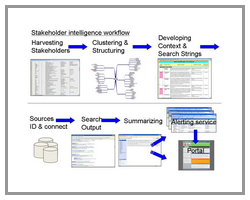 |
Knowledge management
From early on Informationland is helping organisations with knowledge management. Usually these are large, complex and knowledge-rich organisations, with multidisciplinary services of product groups. Informationland is proud of its long list of references, based on successful introduction and development of knowledge management. The last years we increasingly worked with the use of Web 3.0 technologies and its possibilities. Here are some approaches that are used by Informationland:
-
The introduction of knowledge management roles and responsibilities within the existing organisation / information services. Doing knowledge management at a professional level means taking certain responsibilities and tasks, appropriate for the type of knowledge and added value projected in the organisation. We often create knowledge maps and help to start-up processes around capturing best practices, unlocking project experiences, starting and facilitating communities of special interest groups , etc.
-
Working with Web 3.0 , Social Media and Portals for knowledge sharing, knowledge- and innovation management. We work with different tools and scenarios and utilize best practices in which social media support the knowledge work. Often this coincides with the adaptation of core processes in the business model of the organisation. We apply Web 3.0 solutions for knowledge sharing and exchanging with customers, blogging, community building and project management.
-
Develop an action plan for knowledge management. We produce successful plans of action to come to maximum development of knowledge management. In our systematic approach different workflows are appointed, in which steps are defined. This approach also makes clear the relationship of activities of information management, ICT, HR, R&D, Communications & PR and other departments.
-
The business case for knowledge management. Informationlandwas the first concultancy in Europe to make viable business cases for knowledge management. We are able to demonstrate the added value of knowledge management in a logical way. This helps to get knowledge initiatives agreed quicker and budgets more likely to be approved.
-
The development of a knowledge-sharing culture. Informationland has different ways and means to successfully create an organisational culture for optimal knowledge sharing and development.
© 2014 Informatieland